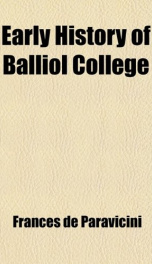early history of balliol college

Purchase of this book includes free trial access to www.million-books.com where you can read more than a million books for free. This is an OCR edition with typos. Excerpt from book: CHAPTER III. The early Chroniclers liked best to tell us about those, who, while worldlings were wrangling and fighting, laboured to promote study, and to diffuse the love of learning. In Mediaeval pages, the prominent names are not those of Kings, and their Captains and Courtiers ; but the names of men like St. Hugh of Lincoln, and Bishop Grosseteste; whose work, steady though noiseless, whether pursued in the Bishop's Palace or the Friar's Cell, must ever be counted in the Wealth of Nations. Yet Chroniclers do not neglect other matters ; and always, as the noble deeds of good men are related with a proud fidelity, so the misdeeds, even of people of importance, are told with unflinching courage. The Monk of St. Alban's, who has, it may be said, saved English History, gives us details of King Henry III. demanding a subsidy, in 1244 ; and certain persons were appointed to consider the demand. They were all men of great reputation, and high position ; whose wisdom, judgment, and integrity, could be relied upon. Andamong them we find the name of John de Balliol. And Balliol's name is again mentioned when a Charter of the King of Scotland was sent to the Pope for confirmation.1 John, Lord of Balliol, in his magnificent Castle, high above Tees, and commanding a far view over surrounding woods and vales, was a Baron of great importance. His riches were considerable ; and included, besides his own property, the large possessions which his wife inherited from her father, Alan, Prince of Galloway. An attempt had been made to deprive the three daughters of Alan of their inheritance ; but it was unsuccessful. Alan's daughters were,Helen, who married Roger de Quinci, Earl of Winchester ; Dervorguilla, who married John de Balliol; and Christian, who married William de Fortibus, afterwar...
Info about the book
Author:
Series:
Unknown
ISBN:
1245790684
Rating:
3.5/5 (3)Your rating:
0/5
Languge:
English
Users who have this book
Users who want this book
What readers are saying
What do you think? Write your own comment on this book!
write a commentif you like early history of balliol college try:
Other books by this author
Do you want to exchange books? It’s EASY!
Get registered and find other users who want to give their favourite books to good hands!

